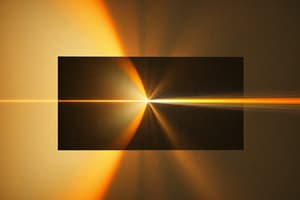Podcast
Questions and Answers
What is the name given to the band of colors produced when white light is split?
What is the name given to the band of colors produced when white light is split?
- Spectrum (correct)
- Rainbow
- Prism
- Color Wheel
What term is used to describe the process of white light being split into multiple colors?
What term is used to describe the process of white light being split into multiple colors?
- Refraction
- Diffraction
- Dispersion (correct)
- Reflection
Which of the following is NOT one of the seven colors in the visible spectrum?
Which of the following is NOT one of the seven colors in the visible spectrum?
- Red
- Violet
- Magenta (correct)
- Indigo
What condition can result from a prolonged deficiency in vitamin A?
What condition can result from a prolonged deficiency in vitamin A?
How do colors appear on a thin oil film?
How do colors appear on a thin oil film?
Who invented the system of writing that can be read by touch using raised dots?
Who invented the system of writing that can be read by touch using raised dots?
Which of the following foods is NOT rich in vitamin A?
Which of the following foods is NOT rich in vitamin A?
What role do antioxidants play in eye health?
What role do antioxidants play in eye health?
Which part of the human eye is identified as the inner aperture through which light enters?
Which part of the human eye is identified as the inner aperture through which light enters?
In which century did Surdas, the Indian poet and composer, live?
In which century did Surdas, the Indian poet and composer, live?
Flashcards are hidden until you start studying
Study Notes
Dispersion of Light
- Dispersion occurs when light enters a medium like a prism or a CD, breaking white light into a spectrum of colors.
- A spectrum, the result of this dispersion, is a band of colors visible when white light passes through a prism.
- A rainbow exemplifies a natural spectrum, created by water droplets in the atmosphere splitting sunlight.
- The seven colors of the spectrum are Violet, Indigo, Blue, Green, Yellow, Orange, and Red, commonly remembered as VIBGYOR.
Color on Oil Films
- Thin oil films on water surface exhibit colors due to the interference of reflected light from both top and bottom surfaces.
- Light waves can either constructively add together (intensifying certain colors) or destructively cancel each other out (diminishing others), leading to the observed colors on the oil films.
Nicholas Saunderson
- Nicholas Saunderson (1682-1739) was a mathematician who lost his sight at an early age.
- Despite blindness, he excelled in mathematics, astronomy, and optics, relying on exceptional touch and hearing for complex calculations.
Louis Braille
- Louis Braille (1809-1852), an educator from France, became blind due to an accident at a young age.
- Developed the Braille system in 1824, using raised dots for reading by touch.
- Modern devices include electronic Braille writers and computer-driven printers to assist visually impaired individuals.
Surdas
- Surdas was an Indian singer and composer born blind in the 15th century, celebrated for his poetry and compositions in Hindi.
- Became prominent at Emperor Akbar's court and is recognized for creating timeless devotional songs.
Nutrition and Eye Health
- A deficiency in vitamin A can lead to night blindness, while maintaining a diet rich in this vitamin (found in carrots, broccoli, liver) can reverse the condition.
- Antioxidants obtained from vitamins A, C, and E help neutralize free radicals that may damage the retina.
- Carotenoids in colorful fruits and vegetables are crucial for eye health and may prevent age-related degeneration of the macula.
Structure of the Human Eye
- The average human eye measures about 2.5 cm in length and has various components that facilitate vision.
- Key parts include the pupil (light entry point), iris (colored part controlling pupil size), cornea, lens, retina (where images are focused), and optic nerve (transmits visual information to the brain).
- Eyelids serve as protective barriers for the eyes.
Studying That Suits You
Use AI to generate personalized quizzes and flashcards to suit your learning preferences.




